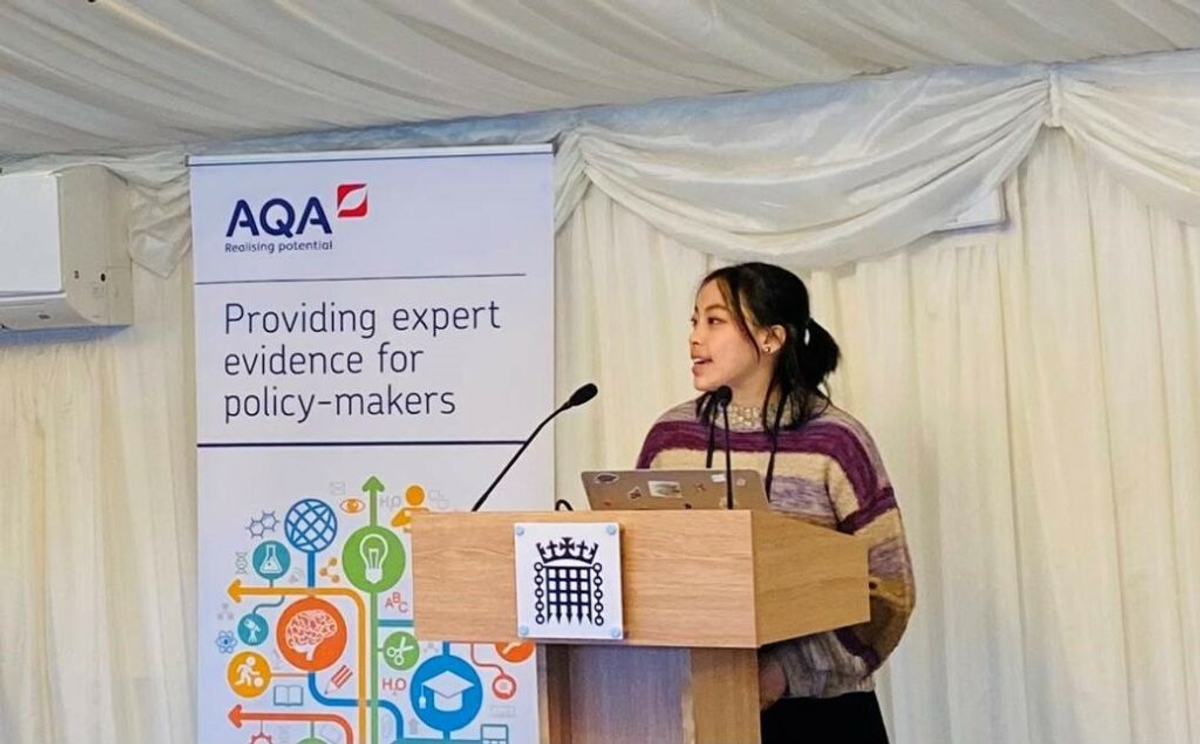
Year 13 student Alison Chang Student Chair of AQA's Student Advisory Group
What is the Student Advisory Group?
The AQA Student Advisory Group is a board of 15 students who meet four times a year with AQA staff and senior officials, to share student insight on learning and assessment.
At its conception, there was debate about whether to enlist one student advisor or a group of them. It was decided the latter would represent a wider array of opinion and be less daunting and less intimidating for the young people involved.
Recruitment to the group always aims to select a geographically diverse cohort to reflect the wide variety of students across the nation, which also gives all those involved a fantastic networking opportunity, collaborating with bright, pioneering members from all over the country we would otherwise never meet.
Being a member on the board this past year has been incredibly enriching. From seeing how AQA operates behind the scenes by touring its headquarters and factories where exam papers are printed, to meeting heads of departments and participating in their research studies.
The journey has been insightful to say the least.
Last week, I spoke at the Houses of Parliament for the new year reception event sponsored by Kim Johnson MP, an opportunity I was absolutely reeling at and felt so privileged to have experienced.
Membership on the board has acted as a gateway to other opportunities. Some students have, for example, sat on the judging panel for the Dame Kelly Holmes Trust, being part of the selection process for a highly coveted mentoring programme.

AQA's Student Advisory Group at the Houses of Parliament for a reception to celebrate its work and welcome new members
What does the Student Advisory Group do?
In preparation for meetings, members are expected to source other perspectives on education from immediate peers or wider communities to contribute alongside their own. As a focus group, we have aired both praise and grievances on what we’ve seen, heard and experienced, supporting issues central to AQA’s immediate development.
This ranged from calling for the increase of equality, diversity and inclusion within curricula to emphasising the importance of students’ mental health.
Alongside present objectives, we also contribute to AQA’s long-term vision. For example, all members of the board piloted ‘On-Screen Assessments’, the digitalised future of schoolwork, homework and even components of GCSE and A-Level assessments.
From our feedback, AQA has affected direct, visible change on the software of these programmes, including adding accessibility features for learning differences.
Why is the Student Advisory Group important?
We know what students actually want because we are students. This is an inherent knowledge that neither teachers nor policymakers can truly relate to. Our advice therefore reinforces evidence of actual student desires, which can be presented to senior officials to convince them of the need for policy change.
We are influencing change that impacts the future of learning. As such, I believe that what we do is consequential. In fact, the sheer existence of the Student Advisory Group is a step towards the inclusion of young people's voice and representation at the table, which so many of leading bodies within education fail to consider, at least non-tokenistically.
What I want it to achieve
If education’s purpose is to prepare future generations for life in wider society, then ensuring the system works for the students it currently serves is crucial, and this is exactly what the Student Advisory Group intends to do.
Looking forward to what is ahead this year, I am ecstatic to work with our fantastic group of board members, having already witnessed their eloquence and ambition at the reception event.
I hope the Student Advisory Group can continue its hard work channelling students’ desires straight to the heart of the changemakers.
I am especially keen to amplify the mood surrounding recent cascading reforms in education including T-Levels, compulsory maths and changes to the university application process.
The Student Advisory Group has become a central part of my life, and I am forever grateful for the opportunities it has given me and others.









